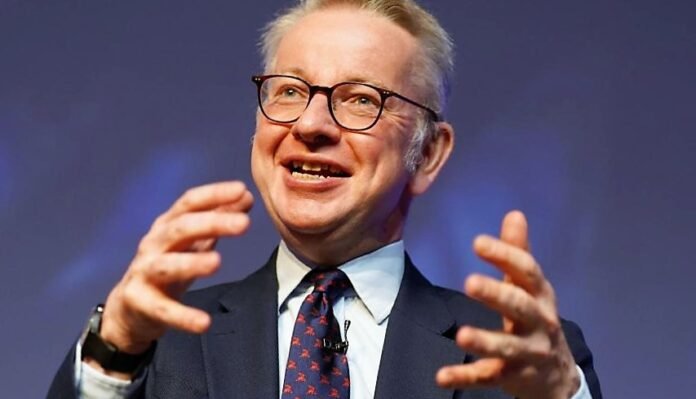Michael Gove Foresees an SNP “Rebrand” with Diminished Emphasis on Independence
In a captivating address at the Scottish Tory conference held in vibrant Glasgow, the esteemed Levelling Up Secretary, Michael Gove, astutely predicts an intriguing twist in the Scottish National Party’s (SNP) political strategy. Brace yourselves for a potential “rebrand” as the SNP, known for its unwavering focus on independence, contemplates a paradigm shift in its priorities.
Gove, never one to shy away from expressing his thoughts, boldly proclaims that the SNP is primed to position itself as “Scotland’s party” in the forthcoming election. Such audacity does not faze him, as he remains resolute in his convictions.
Recognizing the need to retain the fervent support of its base, which remains steadfast in their belief in the promise of independence, Gove concedes that the SNP comprehends the current reality. The majority of the Scottish populace, as it stands, does not share an ardent desire for another independence referendum.
According to Gove’s shrewd observations, the SNP appears poised to revamp its modus operandi. In an act of political chameleonry, the party aims to reposition itself as a formidable advocate for increased resources from Westminster while doubling down on delivering policies that align seamlessly with Scottish values. This strategic pivot, Gove suggests, is borne out of a sober recognition that the Scottish Government’s track record of failures has critically undermined the case for independence.
Dismissively waving away concerns regarding the potential impact of this downplayed emphasis on the union’s security, Gove stands unwavering in his conviction. He boldly asserts that the Scottish population yearns for politicians who prioritize the efficient delivery of public services and the enhancement of the economy, rather than being mired in ceaseless constitutional debates.
The SNP’s Enduring Focus on Independence
Recent rumblings, sourced from the venerable BBC, indicate that the SNP currently directs its energies toward fostering support for independence before embarking on another potentially decisive referendum.
Gove, ever the discerning statesman, reserves praise for MSP Fergus Ewing and former leadership contender Kate Forbes. He lauds Ewing’s vocal opposition to various Scottish Government policies and his unyielding critique of the SNP’s alignment with the Scottish Greens. Equally, Gove commends Forbes for her adeptness at collaborating with the UK Government during her tenure as finance secretary.
However, Gove’s overall appraisal of the SNP as an entity is far from flattering. He keenly observes the party’s financial woes, exemplified by the resignation of its auditors in October, with the position remaining conspicuously unfilled even after six months. Wryly, Gove quips that he would save them the trouble, jesting that the party, in its depleted state, has exhausted both its ideas and credibility. He deems it a bankrupt entity steering a fractured government.
SNP’s Retort and Future Horizons
Promptly responding to Gove’s provocative statements, SNP MP David Linden emphasizes that the party secured an undeniable mandate for an independence referendum during the Scottish Parliament election, garnering an unprecedented number of votes. Linden passionately asserts that the SNP will persistently champion Scottish democracy and the fundamental right of the Scottish people to determine their own destiny. He contends that supporting the SNP in the impending general election serves as the most potent antidote to the Tory presence in Scotland, extinguishing the likelihood of Westminster Tory governments by attaining independence. With unwavering conviction, Linden posits that an ample show of support for the SNP could grant Scotland formidable influence at Westminster, enabling the party to effectively thwart Tory attempts to form a government and secure the best possible outcomes for Scotland.
As the political landscape in Scotland evolves, the SNP finds itself at a critical juncture. The potential “rebrand” envisioned by Gove could signify a significant departure from the party’s traditional focus on independence. By embracing a broader platform that encompasses resource allocation and policy delivery, the SNP aims to appeal to a wider spectrum of voters who prioritize pragmatic governance over constitutional debates.
However, the road ahead for the SNP is not without challenges. The party must strike a delicate balance between retaining its core support base, who remain ardent proponents of independence, while also appealing to a broader electorate who may have different priorities. The success of the SNP’s strategic shift hinges on its ability to navigate these complexities and effectively communicate its new direction to the Scottish public.
In the upcoming general election, the SNP’s fate will be decided by the Scottish electorate. Their choice will determine the future trajectory of Scottish politics and potentially reshape the dynamics between Scotland and the rest of the United Kingdom. The battle lines have been drawn, and it remains to be seen whether the SNP’s altered approach will resonate with voters and lead to electoral success.
Ultimately, the outcome of this political transformation will have far-reaching implications, not only for the SNP but also for the broader landscape of Scottish politics. The decision to pivot away from an exclusive focus on independence reflects a recognition of the evolving aspirations and priorities of the Scottish people. As the campaign unfolds and the election draws near, all eyes will be on the SNP as it seeks to redefine its identity and secure a mandate that aligns with the shifting political tides in Scotland.
In this era of political flux, the SNP’s potential rebranding represents a bold and calculated move. The party’s ability to adapt and resonate with a diverse range of voters will be crucial in shaping the future of Scotland. As the electoral battle commences, the SNP stands poised at a crossroads, ready to forge a new path that may well redefine its place in Scottish politics for years to come.











